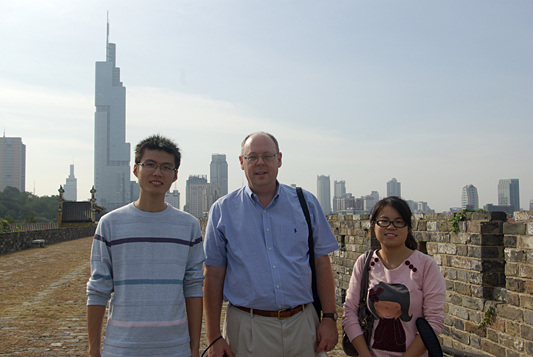The marks of any academic worth her or his scholastic salt may be said to be the ingenuity and adaptability to reshape a research program in response to a changing world. Take as an example Dr. Dan Hammel, UT associate professor of geography and planning, who researches gentrification — the transformation of poor or working class neighborhoods to middle or upper-middle class professional areas.

Dr. Dan Hammel posed for a photo with Nanjing Normal University graduate students Wen Zeng, left, and Xiaohu Wu on the Nanjing city wall. Zeng and Wu, students of Dr. Qiyan Wu, are completing theses on gentrification.
Last fall, Hammel traveled to Nanjing Normal University at the invitation of Dr. Qiyan Wu, professor of urban and regional studies, to pursue his research and study gentrification in Chinese cities.
“I completed quite a lot of work on gentrification in American cities throughout the 1990s, and the census data now exists to use the techniques I applied in American cities to Chinese cities, albeit with some significant alterations due to the differences in the data and in the cities themselves,” Hammel said.
The goal of the project is to measure the gentrification process and better understand how it is realized in China. Hammel said there already seems “to be some unusual and unexpected aspects to the gentrification process in Chinese cities based on what we know about it in other cities around the world.”
“Early indications suggest that gentrification is moving at a rapid pace in Chinese cities, but up to this point there has been little reliable quantitative data available to investigate the process,” Hammel said. “Dr. Wu has been able to gain access to some very detailed census data that will allow us to apply some of the techniques I developed in a setting where gentrification is expanding dramatically.”
The research is expected to include more fieldwork and a number of other case studies in Beijing, Shanghai and Kunming.
During his recent trip, Hammel presented his research on gentrification and mortgage lending at Nanjing Normal University. He also met with graduate students from that institution and Nanjing University to discuss how research works in American graduate programs and the publication process in English-language journals.
Hammel spent most of his time, however, analyzing “small area” Chinese census data and exploring Nanjing to get a firsthand look at the areas of the city he was studying.
He plans to return to Nanjing Normal University this year to continue this work.